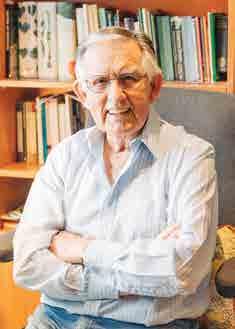
3 minute read
Bill Daly - The Irish Race
The Irish Race
Scattered over the surface of every country in Europe may be found ancient monuments, the remains of prehistoric times and nations, and of a phase of life and civilization which has long since passed away. The men by whom these works were made, so interesting in themselves, and so different from anything of the kind erected since, were not strangers and aliens, but our own ancestors, and out of their prehistoric civilisation our own has slowly grown. No record or tradition has been bequeathed to us, or of its nature, ideas or sentiment, how it was sustained, only by excavation and extrapolation can we learn anything. The following are some words from Historian & Folklorist Standish O’ Grady (18461928). He is rarely mentioned these days, and this excerpt is from his book ‘The Story Of Ireland’, published in 1894. ‘In ancient times the country was full of bards, who, with Standish O’ Grady their harps, used to travel from one house to another, singing songs for the people about the island in which they lived, and the brave deeds of their ancestors. These bards had three names for Ireland which they used more often than others. They called it Banba when they thought of its plains, woods, and mountains; and Fodhla when they thought of it in connection with learning, laws and history; and Eire when they thought of its warriors , heroes, and kings. The bards, too, used to celebrate the valour and excellence of an ancient hero called Ir, and so got into the habit of alluding to the island in their songs as the land of Ir. So we get the name Irland or Ireland , which is in everybody’s mouth today, though it was first invented over two thousand years ago by one of those makers and singers of songs who used to go about the island with their harps, amusing the people and also instructing them in their history. No one knows that bard’s name, or anything about him, yet the word that he invented is known all around the world today.’ A comment was made some years back that the only apparent outward semblance of Ireland achieving freedom from Britain was the fact that the post-boxes were painted green instead of red. This should be taken in the humorous context in which it was meant to be delivered. In 1921 we did not have an awful lot to start with but we were fortunate to inherit the British Civil Service. Some time ago I noticed two wall mounted post-boxes in Cork bearing the royal insignia underneath the green paint. The original British Post Office boxes were bright red. When Ireland gained Independence in 1921 the post-boxes were retained, even the postage stamps were retained with overprints for some time. Now the post-boxes are painted green, but the royal insignia can be clearly seen. The ones I have come across are those of Edward V11, this was Queen Victoria’s son who reigned from 1901 until his death in 1910. When I saw these it struck me as to how short a time we have been out on our own as a country. Sometimes I get the feeling that we can lack confidence and belief in ourselves as we are a small nation on the outer edges of Europe. In the early 1920’s when our first independent Government looked around at what they had to start with, they realised that they had very little. In the previous
Advertisement
CONTINUED ON PAGE 63
BILL DALY
Originally from Tallow in West Waterford, Bill spent 30 years in Cork as a Senior Manager in the Electronics Manufacturing industry with such companies as Apple, EMC and Logitech. He has been working on his own as a Consultant/Contractor in Manufacturing Operations and Materials for the past 18 years. He also attended UCC and has a BA Degree in Archaeology and Geography. Bill is now resident in Connemara, Co. Galway since 2009.










